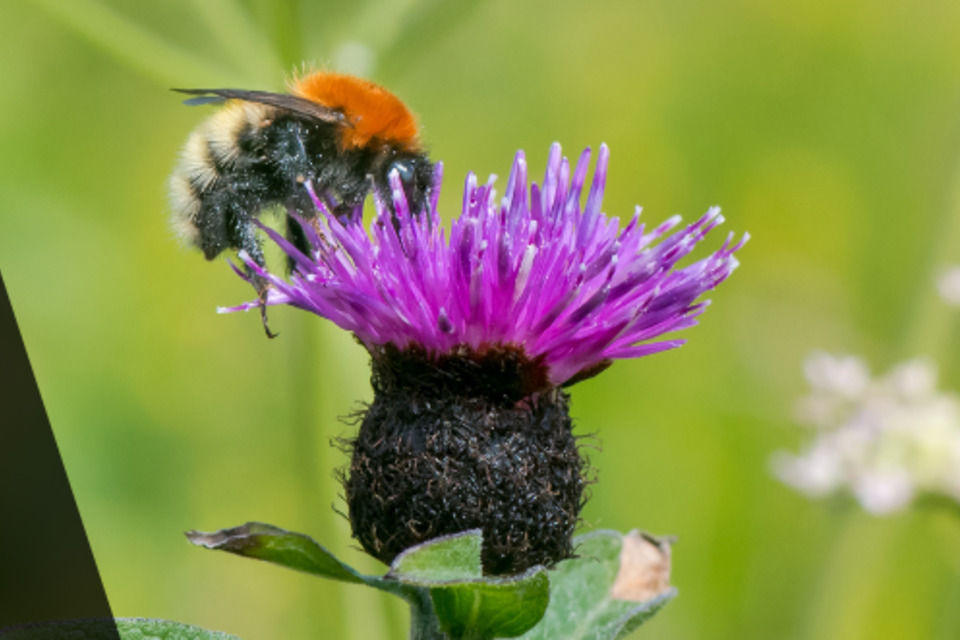Bees’ Needs week 2024
Updated 10 July 2024
Applies to England

Pollinators are a priority for the UK government and a key part of delivering the Environmental Improvement Plan. We know that bees, and other pollinating insects, are an essential part of our environment and play a crucial role in food production.
Defra works in partnership with many organisations and partners to help our precious pollinators survive and thrive.
Everyone has a part to play to encourage more beautiful butterflies and buzzing bees in your local area. We can all take simple steps to protect our pollinators and help to restore our natural world.
Bees’ Needs Week 2024: 8 to 14 July 2024
Bees’ Needs Week is an annual event coordinated by Defra, working alongside a host of organisations such as conservation groups, businesses, and charities.
The aim of the week is to raise awareness of the importance of pollinators, and share ideas, actions and activities that highlight the ways in which everyone can help bees and other pollinators to thrive.
We’d love to have as many people and organisations involved as possible. We will release further details on Bees’ Needs Week 2024 shortly.
To get involved email us at [email protected]. For media enquiries, contact the Defra press office on 020 8225 7318.
5 simple actions
There are 5 simple actions that anyone can take to help pollinators:
- Grow more nectar rich flowers, shrubs and trees. Using window or balcony boxes are good options if you don’t have a garden.
- Let patches of garden and land grow wild.
- Cut grass less often.
- Do not disturb insect nests and hibernation spots.
- Think carefully about whether to use pesticides.
Flower-Insect Timed (FIT) Counts
This year, you can also get involved with invaluable citizen science.
All you need to do is simply spend 10 minutes watching flowers and insects in good weather. FIT Counts can be done anywhere, including gardens and parks in warm, dry weather, any time from April to September.
Every single count submitted to the UK Pollinator Monitoring Scheme (PoMS) helps make our data more meaningful, to help us learn more about where pollinators live and how their numbers are changing.
Read the PoMS instructions for FIT Counts and help us help pollinators!
Bees’ Needs Champions
Each year we celebrate Bees’ Needs Champions. The awards recognise and celebrate examples of exceptional initiatives undertaken by local authorities, community groups, farmers and businesses to support pollinators. Whether that’s creating a wildflower patch, educating the local community about pollinators, or taking special measures on your farm.
In 2024, we had 45 Bees Needs Champions. These awards went to people and organisations who have taken inspiring action, however big or small, to benefit pollinators.
Our 2024 Bees’ Needs Champions were:
- Ampthill Buzz Project
- Asquith Primary School
- Bagber Farm
- Battlesbridge Railway Station
- Bracknell Forest Council and The Lexicon
- Cherry Tree Library Community Apiary
- Cliffe Castle Support Group
- Coton Loves Pollinators
- Cuddington Manor Farm
- Derby City Council Bees Bus Stops
- Eden Primary and Coldfall Primary School
- EJ Barker and Sons, Lodge Farm
- Finchley Pollinator Project
- Friends of Magpie Bottom
- Friends of Portswood Rec and Southampton City Council
- Gadebridge Park
- Grangehurst Primary School
- HMP Eastwood Park Prison
- Huntingdon Riverside Park and Priory Park
- Just Bee Garden in Congleton Park
- Keighley Town Council Pollinator Project
- Liverpool Pollinator Project
- Mrs Burney’s Bee Club
- Neve’s Bees
- Nuts for Nature
- Pinner Park Primary School
- Pollinating London Together
- Poynton Pollinators
- RHS Bumbles on Blooms
- Rosuick Farm
- Rowcroft Hospice Estate and Cricket Field Road Community Garden
- Sherburn in Elmet Town Council
- South Gloucestershire Council for Jubilee Park and Cadbury Heath
- Southerham Lane Field
- Sussex Green Living
- The Ropner Park Training Apiary
- The Farmer’s Arms Community Pub
- The Worcester Environment Group for Worcester City Council
- Walsall Council
- Wapley Common and the Orchard for the Future
- Wellcome Genome Campus
- Whale Island
- Wild About Huntingdon
- Wildflower Lewes
National pollinator strategy
The National pollinator strategy is a 10 year plan published in 2014, developed after a thorough review of the evidence base and wide consultation.
It sets out how government, beekeepers, conservation groups, farmers, researchers, industry and the public can work together to improve the status of pollinating insect species in England.
The National Pollinator Strategy Action Plan sets out more specifically how we will act to fulfil the vision, aims and objectives of the strategy, over the period 2021 to 2024. It details what we will do and how we will monitor progress.
Through our Species Survival Fund, we are creating and restoring nature-rich landscapes full of wildlife-friendly habitats that will help our bees and pollinator populations prosper.
We are also funding Local Nature Recovery Strategies to develop opportunities to restore and create habitats locally, benefiting a range of species including pollinators.
Through our Environmental Land Management schemes, farmers and land managers will play an essential role in halting the decline in species, including insects, by 2030. The schemes offer a choice of support for more regenerative approaches to farming, and creation or restoration of habitats in appropriate areas.
